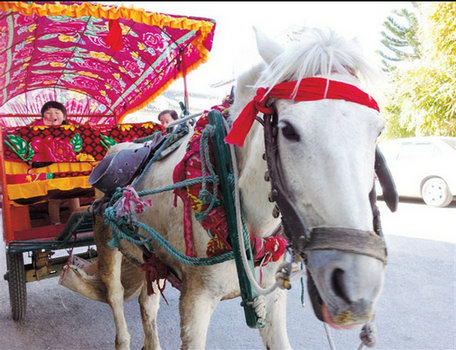 |
|
A comfortable and elaborate carriage with colorful decorations is a nice way to tour the old town of Xizhou.
|
As an urbanite living south of the Yangtze River for more than 30 years, I’m accustomed to hearing praise for picturesque water towns and classical Chinese gardens, sometimes termed “heaven on earth.”
But when I paid a recent visit to the Dali area in central Yunnan Province, I realized there might be another kind of “heaven” on earth.
Set in the Cangshan Mountains near Erhai Lake, the area contains 26 ethnic minorities and colorful cultures, giving visitors both exotica and a fascinating landscape.
It’s was truly a relief to get away from smoggy Shanghai when I saw the crystal blue sky and bathed in warm sunshine as I walked out of the Dali airport.
We decided to avoid the crowds, vendors and well-trodden paths in Dali Old Town, featuring “old buildings” that received very obvious and recent face-lifts.
Instead, we decided to venture into small, ancient towns scattered in the countryside.
They are the real thing, filled with quaint and mostly intact centuries-old courtyards and buildings and surrounded by peaceful scenery. The hurry of the outside world does not intrude.
The local food is delicious and made from natural ingredients only available in the region.
These towns and villages are like pearls scattered around Dali and they have become a magnet for independent travelers pursuing a fresh and different experience.
Among the small towns, Xizhou — literally “Happy Prefecture” — is not very commercial and has not yet been developed for tourism. It is well preserved and anyone who wants to understand the Bai ethnic culture and Dali should not miss it.
Xizhou is just west of Erhai Lake, around 20km from Dali Old Town. As we traveled by taxi through the small town, to be frank, I was a little disappointed at the disorderly streets and garbage littered in the bazaar.
My disappointment did not dissipate until we arrived at a boutique hotel, so chic and elegant, that we decided to stay and explore, saving the tour around the township for the next day.
Renovated from a typical Bai minority courtyard residence built during the Republic of China period (1911-49), the Sky Valley Heritage Boutique Hotel achieves balance between modernity and history. The Shanghainese owner fell in love with the peaceful town and invited an Italian architect to convert the residence, making it comfortable while preserving the original structure and some of the decorative elements.
Sitting in the 100-year-old cobblestone courtyard and sipping a cup of local tea, we appreciated the old bricks, tiles, carved wooden windows and delicate reliefs, which heightened our expectations for the next days’ trip in town.
The daytime seems much longer in Yunnan and I was surprised at the time shown on my watch when sunshine sneaked through the curtain and awakened me. As recommended by online travel guides, we took a horse-drawn carriage after breakfast to begin our one-day tour.
Simple carts are still common transport and visitors can see Bai women in traditional dress hail the drivers to take them to the fields, or back home. They hail carts the way we hail taxis.
Given the increasing number of travelers, some smart hostlers and inn keepers have upgrade their carts into more comfortable and elaborate carriages with colorful decorations and turned the tours into sightseeing experiences.
